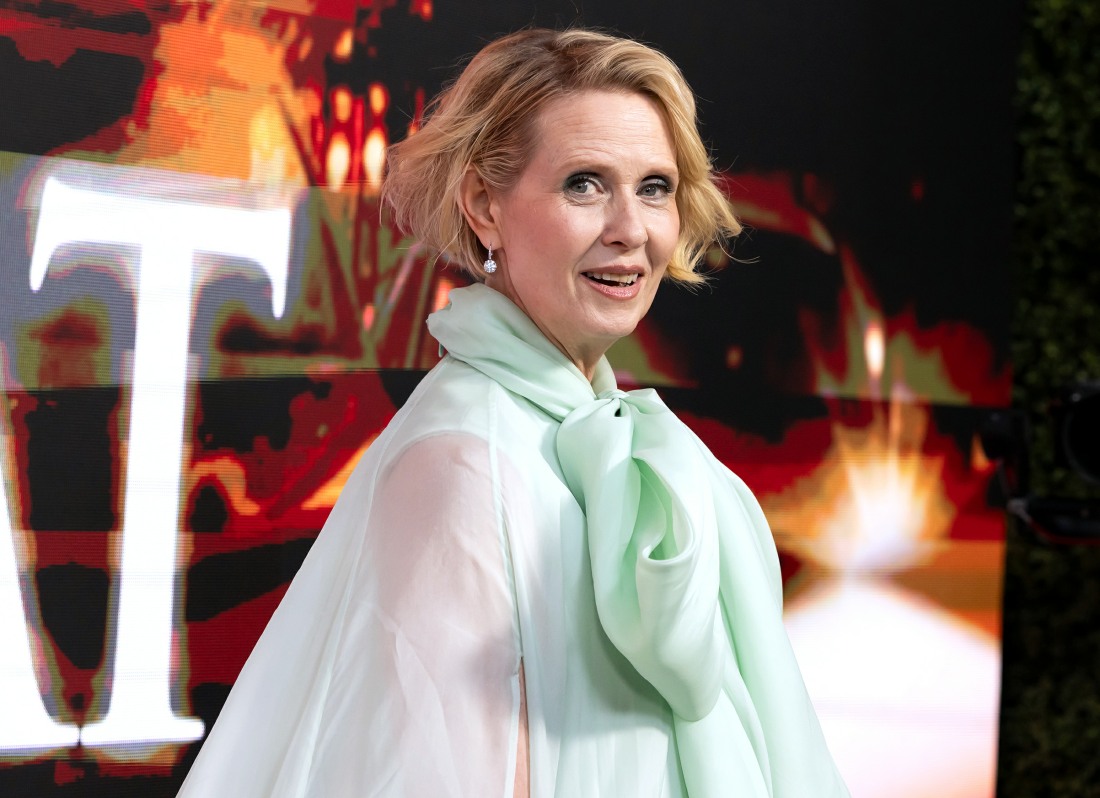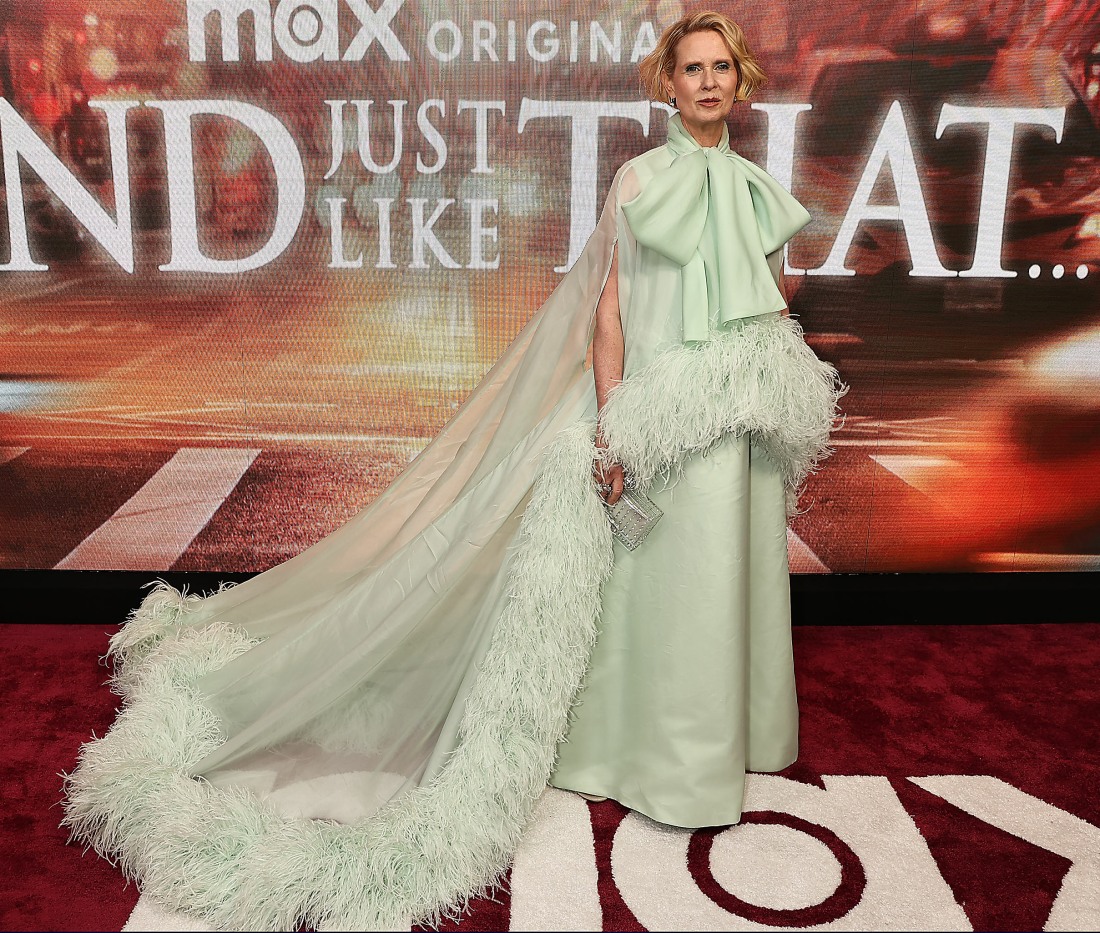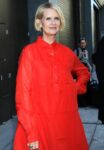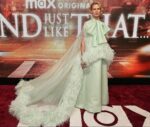Cynthia Nixon is, in my opinion, the most talented person in the Sex and the City/And Just Like That franchise. Nixon was always a working actress and she approached the franchise as something fun and light, a good paycheck in between theater gigs and more interesting work. Over the years, she seems to have embraced the fact that Miranda Hobbes is her most recognizable character and she leans into it without letting it define her (it helps that she’s also iconic on The Gilded Age!). Well, Cynthia has an interesting interview in Grazia to promote the third season of AJLT. Some highlights:
The mood among liberals in New York living under Trump 2.0. ‘It’s terrible. It’s very hard to even say: how are you?’ She shakes her head, lists a few things she is newly concerned about this week (‘Like, why would we need a Department of Education? Ha!’)…‘I’ve been throwing myself into a number of political things. You’re in despair all the time anyway, but either you’re in despair and paralysed, or there are things you’re working on.’
She insists that SATC is a feminist show: ‘[It was] a feminist show – it’s always been a feminist show. What you have to remember is that we were in our thirties and forties. Of course, I look at the show now, we look like babies, but being single at that age, at that time, still had a kind of stigma.’ Its central message was unheard of: ‘You can be a woman, you can have a lot of sex with a lot of different people. It didn’t make you a slut and it didn’t mean you were using sex to get something. You were having sex – because you enjoyed having sex!’
How people’s perceptions of Miranda have changed: ‘People used to see her as very didactic and strident and humourless,’ says Nixon. In recent years, however, she has developed a cult following, and many fans are firmly Team Miranda. Nixon has noticed the shift. ‘Stuff she was ballyhooing from the rooftops, I think, became common wisdom. The culture did sort of move to meet where Miranda was standing…I mean, that has been true in recent history. Of course, in America, and I think in many places, the world is moving again. Away from a lot of the feminist ideas that Miranda had.’
She did a big SATC rewatch before AJLT: She felt that 90% was ‘still pretty great’, but ‘certain things have really not aged well’. Even at the time, ‘it was always very difficult being on a show that was so white. I always hated that. When we would raise it, we were told: this is Candace Bushnell’s world and it’s a very white world. I’m like, OK…’ she says. Also, she says, ‘some of the trans stuff, some of the gay stuff was a little cringy to look at’.
The AJLT storyline of Miranda leaving husband Steve for the polarising Che Diaz: Nixon says the ‘poor Steve’ narrative ‘doesn’t really bother me. Our show always killed its darlings. If we’re just gonna play it safe and nice, why are you watching?’ Nixon, who suggested Sara Ramirez for the part of Che, says, ‘I love Che, I love Sara. It’s hard to know what people would have made of Che if Che hadn’t ostensibly broken up Steve and Miranda. But I don’t want a show in which everybody is behaving well all the time. A feminist show doesn’t show women being perfect.’
Women, ageing and child-rearing: ‘When you’re getting out of your childrearing years it is like a form of adolescence. You can return to yourself. There’s a lot more behind you than ahead of you. And so it’s like: how am I feeling about where I’ve got to so far? And if I don’t like it, am I going to do something about it?… I feel like there is a desire to have women who are of childbearing age, sort of bland and sane, because we don’t want women who are looking after children to be scary and complicated.’
She’s right about SATC being radical at the time – you have to understand, it was about Gen X women in the late ‘90s and early ‘00s who were materialistic, fun, immature, flawed and really screwed up about love and sex. While it was far from a perfect representation, I absolutely agree that the show was groundbreaking at the time. It reminded a lot of women that they didn’t have to have everything figured out by the age of 30, that there is a lot of life to be lived. As Nixon says, though, there are some really problematic episodes, but that’s true for most shows from the ‘90s (coughFriendscough). What Cynthia says about the representations of “childrearing” women is really dead-on as well.
Photos courtesy of Cover Images.
- Celebrities at ‘The View’ show studios Featuring: Cynthia Nixon Where: New York City, New York, United States When: 19 May 2025 Credit: Roger Wong/INSTARimages
- New York series 3 MAX Original ‘And Just Like That…’ photocall Featuring: Cynthia Nixon Where: New York, New York, United States When: 21 May 2025 Credit: Janet Mayer/INSTARimages.com
- MAX Original ‘And Just Like That…’ Season 3 Series photocall at the Crane Club Featuring: Cynthia Nixon Where: New York, New York, United States When: 21 May 2025 Credit: Dave Allocca/Starpix/INSTARimages
















I remember seeing her in movies as a child in the 70s like “Little Foxes” 💚…I still can watch TF outta SITC…because I have had my share of being messy & having messy friends😱🤣 and I’ll be getting MAX next month AFTER all the episodes AJLT load❣️
Met Cynthia Nixon at my job a couple of years back. At the time, she was running for governor. She’s super sweet, smart, lovely and she took photos with a couple of my colleagues.
Unpopular opinion: As a New Yorker, I hate SATC. In the beginning, yes, it started out as a showcase of being a woman (albeit white only) living, working, dating in NYC, but then it morphed into cliches and bad puns with New York Women stereotypes. Add to that, those SATC feature films that proceeded to mock women from different cultures. Sorry, not sorry. But I will see myself out of this thread…
I loved the first 3-4 seasons. Loved. And then it became exactly what you’re saying. Puns, and high school play-pull a face-style acting and just… cartoonish.
S A t c is a groundbreaking show and well cast. It was not totally feminist what with Carrie going back to big who mostly treated her badly. I think the tacked on reuniting with big at the end seemed rushed. Carrie should have been single at the conclusion of the show. Carrie also blamed Natasha for marrying big when big went to Paris and left carrie. Carrie should have not ended up with him. Imo.
I give it credit for a huge cultural shift in attitudes about women’s sexuality, especially after 40. It’s a different world than the Golden Girls era of women being frumpy at 50. So in that sense hell ya it’s feminist. And I’m grateful.
But I also despise the show because the characters are so materialistic and vapid. Well, Carrie and Miranda anyway. Which to me plays into the worst stereotypes about women.
I absolutely agree with your take here, Tessa.
Not strictly about SATC but I just watched the first episode of season 3 of AJLT, and it was pathetic. Pathetic with a nice smattering of cringeworthy.
As a fan of the show from the beginning (& also invented something that was the only idea out of writers room to make into storyline*season 4, episode 6* nipple enhancers)… was crushed again how cringe the first episode was. Where are the women writers from original!? Paging Cindy chupack & other women. At this point watching for sjp, Miranda, Charlotte, the clothes & always hoping!!!
As a person of color, SATC, the films, And Just Like That, are the epitome of white feminism. I only ever saw the first season of SATC there isn’t a lot that I can relate to in the show so I stopped watching. Samantha was the only character that I felt I might have something in common with.
The show wasn’t racist per se. Their version of feminism was fine and an honest depiction of feminsm for women in elite positions. It just gave zero thought to women of color, which at the time it was made, was very typical. It just wasn’t meant for a woman like me to watch and understand. It didn’t have to be and did just fine without me ever completing it. Many women love it and that’s fine. Cynthia Nixon can be right and it can be acknowledged but it should also be acknowledged that the feminism portrayed is not relatable to all women.
Thank you for this. I’m white but I struggled to understand what “white feminism” referred to when I was younger. I actually wish someone had just pointed to SATC and been like “it’s that.” Like, yeah it’s great to be able to do the things rich white men can do, be uber successful, sleep around, ignore social justice movements because they don’t affect you. But at the end of the day, if all you’ve accomplished is being the man, what have you really contributed?
The first movie was not feminist. Carrie misplaced blame on Miranda when big jilted her and it was all on him. Charlotte should have been paired with harry from the get go. The trey episodes in the series were bad.
The whole franchise entirely lost me over the bizarre and unrealistic behavior of Samantha in whichever movie it was where she dumped the guy who loved her–through cancer and everything–so she could go back to banging strangers at bars. I don’t know any healthy fifty-year old women who would dump a perfectly fine man who adores them to bang strangers in a bar. That’s not called feminism; that’s called unresolved trauma or possibly untreated sex addiction. It’s certainly not any sort of character development.
And I can easily understand why Kim Cattrall wanted out of playing a character that hasn’t developed in any meaningful way after twenty or thirty years.
Agreed. I hate what they did to Samantha. In fact, come to think of it, I hated what they did to all of them, as a matter of fact, in the movies.
Absolutely not. Sex positive, yes. Great friendships, yes. Feminists don’t wait decades for a guy. Marrying Big forever removed it from that category. Worrying five years for the next dude as she’s doing now, being available as he deems acceptable, not at all feminist.
To me, there was always a deeply misogynistic undercurrent to SATC, which has only been amplified in AJLT. I think it’s because the entire world is a gay man’s projection of all women as grotesque caricatures of real humans. Exhibit A being Samantha. But all of them, really.
I was a devoted reader of The Observer back in the day & the column had only a glancing resemblance to the series.